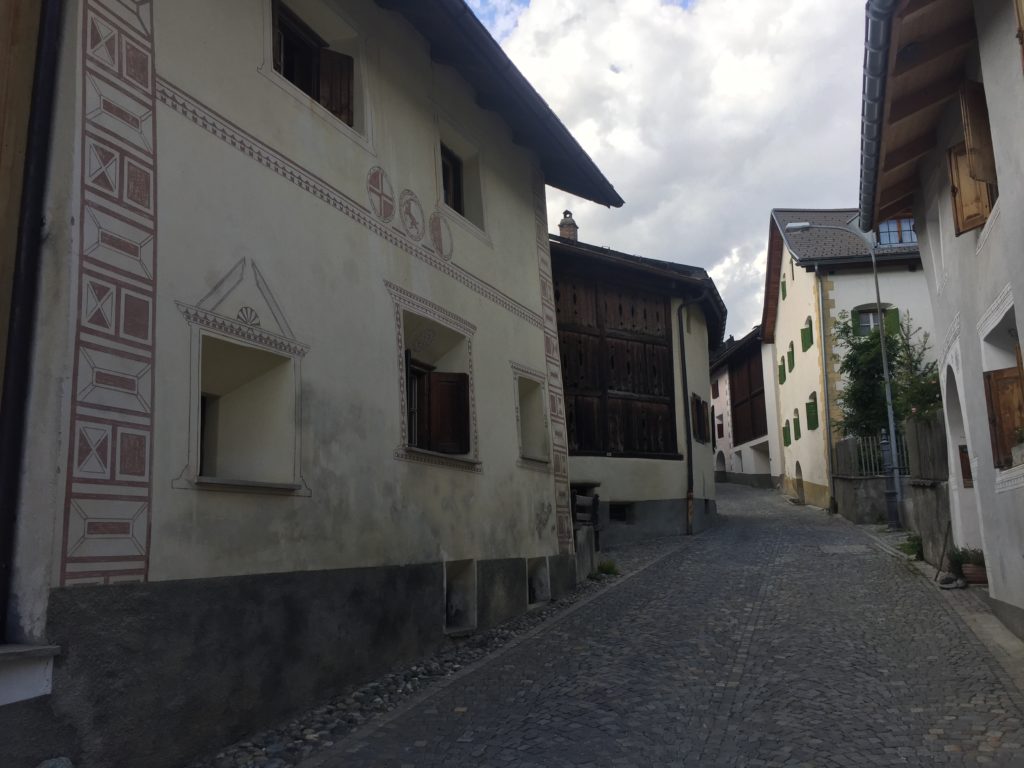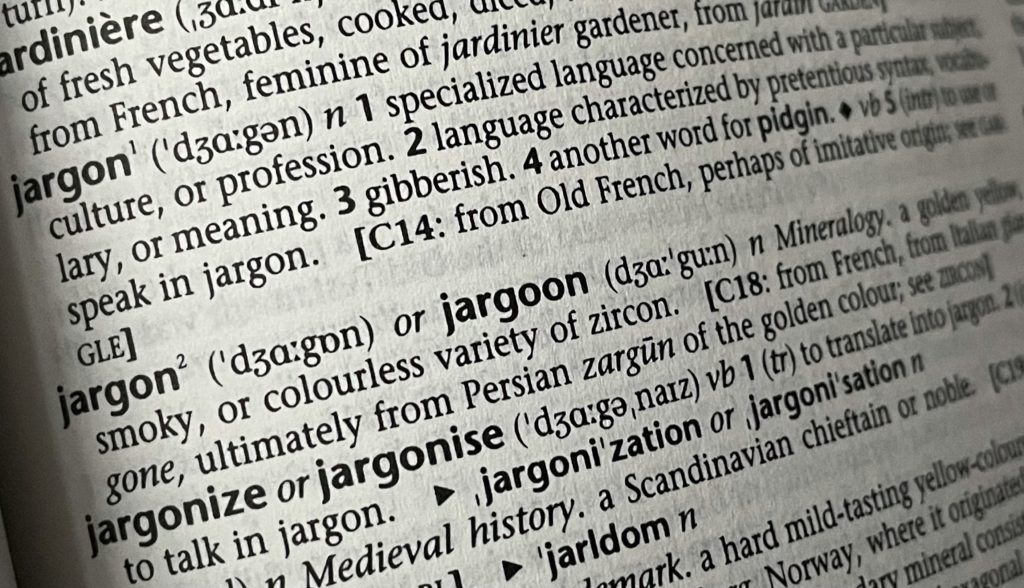Allegra means “hello” in Rhätoromanisch, (alternatively spelt Romanisch, Rumantsch etc) a language spoken by approximately 36,000 people in parts of the beautiful canton of Grisons / Graubunden the east of Switzerland. It doesn’t just mean hello. It’s a greeting wishing the other party happiness. It originates from the full expression “Cha Dieu ans allegra!” (or may God bring us joy). For me as person curious about the origins of words it also provides some interesting insight about the people who greet each other in this way, which is much nicer than just a mere “hello”. Rumantsch is spoken by approximately 0.5% of the population of Switzerland and is an endangered language. Very few people speak and understand it, and over the past 20 years other languages have grown in dominance, although curiously, the number of speakers has remained level for about 20 years (which must be a good thing!).
Languages and dialects (and place names based on these) provide valuable clues to how words and place names evolved or migrated, giving us an insight (for those who care to look) into the past and origins. When I see a word I don’t know, I start to wonder where it comes from, to try and interpret what it might mean. Sometimes I can intuit some fairly accurate insights based on clues, and sometimes I’m just dead wrong, but I enjoy the mental exercise.
According to a National Geographic article from 2014, between 230 languages died out completely between 1950 and 2010. Apparently, there are still about 7,000 languages spoken over the world but about a third of them are currently considered endangered with less than 1,000 speakers left. Every language, and dialect, holds its own story, its own time capsule in some way.
For those who don’t understand Rumantsch (95.5% of the population of Switzerland, for starters) hearing or seeing a language is fascinating but doesn’t facilitate practical dealings when you’re in the region. Therefore most people living in Grisons (Graubunden) also speak German.
Perhaps the question becomes, if no-one else understands the language, and the population who does is shrinking, does it make sense to keep trying? As a passionate wordsmith I believe the answer is very much “yes”.


Perhaps the question becomes, if no-one else understands the language, and the population who does is shrinking, does it make sense to keep trying? As a passionate wordsmith I believe the answer is very much “yes”.
I am delighted to have seen the reversal in the decline of some languages and dialects in Europe in recent years, such as Welsh, Catalan and Bavarian as people realise the heritage and character they surrender by losing a language. Whilst some governments played their roles in suppressing regional languages to assimilate cultures under standard languages spoken by the central governments (British promoting English, in the case of Welsh, the Spanish dictatorship of Franco in the case of Catalan and the post-unification of other German lands to Prussia in the case of Bavarian and, to a lesser extent, other German dialects), we lose something we can never get back when a language dies out. The sense of fun and character I encounter in Bavarian (or indeed Swiss German dialects) has something to it that is simply not present in Standard German, even if I don’t always understand everything, and I can always learn an interesting new word or expression.
Indeed, the Swiss have a number of different dialects in German which aren’t commonly understood by anyone not from the area. If we (wrongly) treat all Swiss dialects as a single Swiss German, we could say that just over 4m people speak Swiss German (compared with a total 130m German speakers worldwide). However, the Swiss are aware that many visitors don’t understand dialect, and are very polite, so usually switch automatically to standard German when speaking to foreigners, or English, partly due to good manners, but also to be understood.

As a lawyer I often encounter specialist language which I perhaps sometimes wish was on the decline. However, in law and tax (and also other technical fields) we develop a kind of shorthand to be more efficient with words. This way, we can save long explanations and just use the technical expression, which works among the community that speaks and understands this language, and in that environment these words often find their place. However, the broader community, which may include clients and colleagues doesn’t always understand the term and needs some help understanding it.
In legal documents it can still be helpful to include the text to save space. For example in a will or trust, using the two words “per stirpes” is much more efficient than describing the way that a gift passes to the descendants of the original recipient of the gift, going one generation at a time, and splitting equal shares per generation. It’s less likely to be misunderstood than a bunch of different attempts at explaining it in plain English, so we use the latin, to save a few lines of text, and to be precise in a legal document, where clarity is essential.
Whilst there is clearly a useful aspect to using these technical expressions, how often have we seen letters of advice or presentations littered with jargon or technical expressions, where it’s sometimes not even clear to other specialists what the author wants to say, let alone lay clients. Whilst it’s possible that some technicians are simply unaware that their routine language may be difficult for others to follow, perhaps the excessive use of technical language could appear to suggest to a client that the writer is too keen to show off how clever he (or she) is by using the fancy terms he can throw in to a sentence, but doesn’t consider whether using these confuses the client her helps them. Whichever the cause, perhaps it’s time to look again at how we as private wealth advisers speak to our clients to make sure we’re all speaking the same language.
I like to keep things simple. If there’s no reason to use jargon I’d rather avoid it. If I can’t avoid it (because of efficiency or accuracy reasons) I need to explain it the first time I use it so that my recipient understands what I want to say, and also that I’m not just trying to show off or confuse them. It’s not that I’m stupid, I just don’t see the point in persisting in using words that I know other people don’t understand, so I either use different words, or try to make sure the other person understands the word I can’t avoid using.
I strongly believe that it would benefit the users of technical expert services, particularly tax and legal advisers, if other specialists would do the same. Too often I read an advice which is peppered with technical expressions that I struggle to understand, and which many a lay client wouldn’t understand either.
I’m not suggesting that technical language is inherently bad. It has its useful place when communicating between people who understand it. You can get to the point quicker that way.
My proposal: The two-track approach
I see parallels here between technical terms and unusual dialects. Both have a richness or utility that make them important to maintain. We don’t want to live in a 1984-esque society where everything in language has been standardised to the nth degree so that we all communicate like simpletons.
However, standardisation is boring. Our own special languages are rich and colourful and filled with history and meaning, but a bunch of people who can’t understand each other isn’t such a practical outcome, so I suggest the most sustainable outcome is a two-track system. We each keep our special forms of speech for communicating in our special communities, but we maintain a common language so that we can communicate our thoughts, needs and ideas and be understood by the other party. I enjoy the richness of my British English but I adjust my vocabulary, use of idioms and manner of speech when I’m speaking to non-native speakers because it is more important to be understood.
The concept of preserving a common language for more efficient communication is nothing new. For hundreds of years in Europe, French was the language of diplomacy, ensuring that dignitaries and diplomats could understand each other easily when overseas, whilst people still spoke their own languages at dialects at home. In Game of Thrones, each folk would communicate with each other using the “Common Tongue” too. I would hate to see languages die out (either technical or cultural), and there are some efficiencies in technicians being able to discuss things quickly in a “doctor to doctor” conversation, but when communicating with a broader base, there is more kudos to be had in communicating specialist knowledge translated into a language that everyone can understand!
Thanks for reading!
PhilG
Thank you, next please!
If you’re worried about missing the next article, please let me have your details and you can be one of the first to find out!
The mailing list is hosted on Mailchimp and only used for sending new article alerts. You can unsubscribe at any time.
